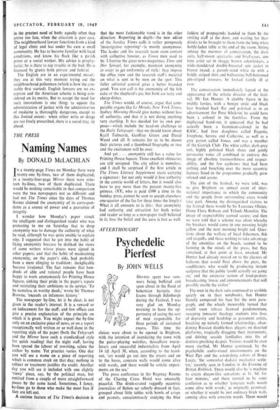Psychedelic Pierfest
AFTERTHOUGHT By JOHN WELLS
The press conference in the Regency Rooms of the Charing Cross Hotel was unusually peaceful. The drink-crazed raggedly eccentric journalists of fiction sat soberly dressed in fact, grouped about little tables with bowls of crisps and peanuts, conscientiously studying the blue folders of propaganda handed to them by the smiling staff at the door, and waiting for their drinks to be brought to them from the long white bottle-laden table at the end of the room. Sitting among the murmur of conversation, the dark suits, half-moon spectacles and brief-cases, one lone artist sat in shaggy brown sidewhiskers, a wide-shouldered double-breasted spiv jacket in brown tweed, a parody-sized white tie with a boldly striped shirt and ballooning bell-bottomed pin-striped trousers; he looked faintly ill at ease.
The conversation immediately lapsed at the appearance of the artistic director of the festi- val, Mr Ian Hunter. A chubby figure in his middle forties, with a benign smile and black hair brushed back flat and polished as in an advertisement for Pure Silvikrin: he could have been a colonel in the Gurkhas. From the duplicated hand-out, it appeared that he had actually been a lieutenant-colonel in the RASC, had four daughters called Eugenie, Josephine, Serena and Catherine, as well as a grey parrot called Joneo, and was a member of the Garrick Club. The white collar, dark-grey suit, highly polished black shoes and gently persuasive voice all combined to endorse this image of absolute trustworthiness and respect- ability, and the few eyebrows that had been arching and bunching over the more eccentric features listed in the programme gradually grew relaxed and serene.
The aim of the festival, we were told, was to give Brighton an annual event of inter- national importance in which the community and the people from surrounding areas would take part. Among the distinguished visitors to the festival there would be Sir Laurence Olivier, Dame Flora Robson and Yehudi Menuhin. The image of respectability seemed secure; and then we were told that a scheme was afoot whereby the breakers would come in one morning bright yellow and the next morning bright red. Ques- tions about the welfare of local fishermen, fish and seagulls, and those wishing to take advantage of the amenities on the beach, seemed to be forming in the minds of the press, but they remained, at that point at least, unasked. Mr Hunter had already moved on to the clusters of balloons that would float above the piers, the sandblasters who would be producing instant sculpture that the public 'could actually see going on,' and the extensive system of loudspeakers broadcasting 'music and announcements that will possibly startle the visitor.'
The men in the dark suits continued to scribble quietly on in their notebooks, Ian Hunter blandly composed his face for the next para- graph, and the wheels inexorably turned that would soon release licensed pandemonium, sweeping innocent theology students into lives of depravity and hardship as pavement artists, breaking up naively formed relationships, aban- doning Russian double-bass players on deserted platforms, tragically dragging their instruments, and driving seaside landladies into fits of denture-gnashing despair. Visitors would be even more startled, Mr Hunter continued, by the psychedelic audio-visual environments on the West Pier and the astonishing robots of Bruce Lacey, 'the somewhat dadaist mechanist sculp- tor,' recently seen in London in An Evening of British Rubbish. There would also be 'a machine to create dream-like sensations at Is. 6d. for four minutes,' and there seemed to be some confusion as to whether 'concrete walls would come alive with words,' as originally promised. or whether it would be just ordinary brick walls coming alive with concrete words. There would anyway be a lecture in French by Olivier Messiaen on 'The Use of Bird Song in Music.'
Most of the questions, before the composers and artists stepped forward to outline their own individual contributions, seemed to come from a man at the back in horn-rimmed spectacles whose muted moral indignation seemed to sug- gest the Daily Express, or possibly the Mirror. How many people did Mr Hunter imagine would want to listen to a lecture in French about bird song? What was the difference between a 'psychedelic' happening as listed in the catalogue and an ordinary happening? What was the exact nature of the 'fantasies' offered by the dream machine? Would members of the Festival Ensemble be posing in Regency costumes?
But the questions did little to disturb the atmo- sphere of complacent creativity, and the press settled back to receive more detailed information from the artists themselves about exciting new Russian percussionists, a play for children called originally The Dump—`at first I had the most extraordinary reaction: they seemed to think it was some sort of kitchen-sink-for-children stuff': and details of the audio-visual environment with 'this vast giant control-room looking out at a vast great scene in deep space with a vast amount of information being channelled in from the farthest reaches of the Cosmos.' It all sounds extremely psychedelic. I just hope the moral fabric of weekday Brighton and its burghers is sufficiently resilient to withstand the cultural deluge.



































 Previous page
Previous page